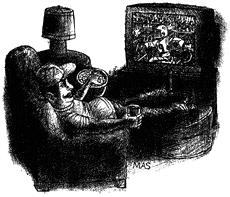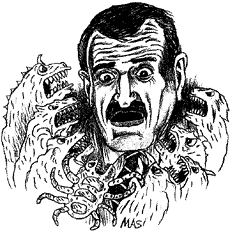Reviewers reviewed.
Art
"Giambattista Tiepolo, 1696-1770" (Metropolitan Museum of Art). Tiepolo revisionism achieves critical mass. With 80 paintings and 33 etchings at three different shows at the Met and drawings by the artist and his disciples at the Pierpont Morgan Library, "New York is now Tiepolo town," says Wall Street Journal critic Deborah Solomon. "These shows make it clear that the once accepted view of Tiepolo was wrong," says Time critic Robert Hughes. (The conventional wisdom on the 18th-century painter: He was said to be "a decadent ally of aristocratic taste"--Solomon; "an advocate of pomposity, cynicism, and costume drama"--Francis Haskell, New York Review of Books.) Hughes sees new levels of wit in Tiepolo's paintings: "[T]he distanced, self-aware theatrics of his style--his parade of visual language as a source of delight--make him look modern." Solomon sees precocious postmodernism: "[H]ow do you achieve greatness in an age when everything has already been done? The answer: You recycle." But Haskell damns all efforts to make Tiepolo a painter for our time: "[We] are most reluctant to admit that the finest art can flourish in harmony with the ruling classes and without the tensions that beset us now, so that, where necessary, we try to detect such tensions in the art of the past." (Check out the Web site of a Tiepolo retrospective held last year in Germany. It has reproductions and commentary.)

Event
Halftime at Super Bowl XXXI (Fox TV). Madison Avenue typically debuts its flashiest commercials during the Super Bowl, and critics predicted that these would hold more appeal than the game itself. On the other hand, the death of Laura "Dinky" Patterson during a rehearsal for a bungee-jumping routine led reporters to question whether organizers had finally gone overboard. But reviews of all the halftime spectacle were favorable. "An eventful game combined with a cavalcade of crafty commercials kept Super Bowl XXXI lively and entertaining yesterday," says the Washington Post's Tom Shales. According to Shales, Fox (making its first Super Bowl telecast) proved that it could cover the big game with as much "zest and panache" as the bigger networks. Other critics' picks: performances by James Brown and ZZ Top (though the New York Times' Richard Sandomir complained that they lip-synced badly); an ad showing a digitized Fred Astaire dancing with a Dirt Devil vacuum; and a Visa Check Card commercial starring Bob Dole. Nonetheless, the New York Times' Stuart Elliott complains that "too often, the effect was of ... being cajoled or maybe bullied into being entertained by a boor repeatedly accosting you to ask, 'Having fun yet?' " (See "TheWeek/The Spin" for more on the game itself.)
Movie
Kolya (Miramax). Critics compare Kolya, the top-grossing Czech film in decades, to such 1960s New Wave classics as Jiri Menzel's Closely Watched Trains (1966) and Milos Forman's Loves of a Blonde (1965). But Kolya is also damned with condescending praise. The plot--father comes to love adopted son--is familiar; the "directorial style is unobtrusive and free of flourishes" (Elliott Stein, Village Voice). Director Jan Sverak "really knows how to give it that warm, ironic Mittel Europa charm and subtlety," says Kevin Thomas in the Los Angeles Times. "[S]entiment with sly political humor," says Joe Morgenstern of the Wall Street Journal. The Voice's Stein predicts that it will become "this year's Il Postino." (Miramax plugs Kolya at its site, where you can download video and stills.)
Book
The Island of the Colorblind, by Oliver Sacks (Knopf). Reviews are unusually mixed for a book by the popular Sacks. The Island of the Colorblind, which explores both disease--achromatopsia (color-blindness) and lytico-bodig (a disorder similar to Parkinson's)--and Micronesia, is being dismissed as half botanical treatise, half travelogue. "Apart from observing the unsurprising fact that color-blind weavers are skilled at distinguishing subtle tones, Dr. Sacks can do little more than give us an ordinary-if-well-written travel essay," says novelist D.M. Thomas in the New York Times Book Review. "Whereas descriptions of human illness are inherently interesting, it is difficult for most readers to get as worked up about cycads and ferns as Sacks seems to be," says the WashingtonPost's Abraham Verghese. Sacks' eclecticism doesn't bother Slate's Luc Sante, though: "This oddness is a measure of the personality that unifies it." And Thomas concludes that Sacks succeeds for all the familiar Sacks reasons: Because he shows "how patients who are truly isolated and insulated by a disease can retain their humanity, their dignity." (Random House excerpts the book at its site.)
Theater
The Steward of Christendom (Brooklyn Academy of Music, Majestic Theater). The best thing about this play, apparently, is Irish actor Donal McCann (The Dead, Stealing Beauty). McCann plays a 70-year-old ex-superintendent of the British-run Dublin police force who is now committed to an insane asylum and brooding over his past. McCann's performance is said to be almost unbearable. The Wall Street Journal's Donald Lyons says that McCann "fearlessly exposes a man like a surgeon probing his own wounds." New York's John Simon says, "It is all McCann's play, and can he play!" Neither Simon nor Lyons likes Irish playwright Sebastian Barry's work (Steward is one of five dramas about his own kinfolk), however. "[L]ike Beckett written for soap opera," says Lyons; its "sometimes poetic, sometimes pseudo-poetic, and intermittently flat prose" seems a pale imitation of, alternately, Eugene O'Neill, James Joyce, Hugh Leonard, Brian Friel, and Shakespeare, says Simon. But the New YorkTimes' Ben Brantley claims the play "bears the rare mark of theatrical greatness: it is rooted in specific, even earthy details but it sets off echoes that go way beyond its sad story." (The Brooklyn Academy of Music plugs the play at its site.)

Movie
Fierce Creatures (Universal Pictures). The verdict on Fierce Creatures: nowhere near as funny as A Fish Called Wanda (1988). Shots of cute animals are deemed an inadequate substitute for the cutting wit that made the earlier film (by the same cast, and also written by John Cleese) a cult hit. "Instead of Wanda's delicious anti-PC nastiness (flattened lapdogs, stuttering jokes) and bawdy high-spiritedness, Fierce piles on sight gags as crass commercialism runs amok in the zoo," says the USA Today's Susan Wloszczyna. "It feels like it's been directed by a taxidermist," says the Village Voice's Howard Feinstein. Other problems: no story line, cheap puns, and heavy-handed sexual innuendo. "There is a curious antiquarian feeling, in fact, to the whole leering enterprise," says TheNew Yorker's Anthony Lane. The Washington Post's Desson Howe and Slate's David Edelstein insist the film still has its virtues: Every so often, "something wickedly inspired will come along" (Howe); the film's still "more agreeable than most of the slapdash laugh-machines around" (Edelstein). (See the official Fierce Creatures site.)
Book
Le Divorce, by Diane Johnson (Dutton). Diane Johnson (The Shadow Knows, Lying Low) updates Portrait of a Lady in a "comedy of manners" about an American film-school dropout named Isabel in Paris. The novel "reminds us that even in our own day, it remains, as Henry James said, a complex fate to be an American," says Malcolm Bradbury in the New York Times Book Review. In the New York Review of Books, Gabriele Annan says Johnson's contribution to the innocents-abroad novel is her spirit of lighthearted seriousness: Le Divorce "takes desertion, suicide, and murder in its stride, as though they were merely obligatory literary devices." One shortcoming: The plot "veers into melodrama that seems a bit outsize for the scale of events that lead to it" (Christopher Lehmann-Haupt, the New York Times). (Click here for the Le Divorce page on the Dutton site.)
Updates
Evita: In the New Republic, historian Enrique Krauze lists the horrors of Perónism glossed over by the musical and film: the torture and murder of political opponents, often under Nazi tutelage; the sheltering of war criminals, possibly for personal profit; the destruction of the Argentine economy; the laying of the cornerstone for the "Dirty Wars" of the 1970s and 1980s. "It must not be forgotten ... that this woman and her husband also represented the worst of this tradition, the worst of our century," writes Krauze. ... More on Dick Morris: In the New York Review of Books, Gary Wills concludes that "the real Dick Morris scandal ... has nothing to do with sex or personality or ideology. It has to do with the bottomless demands for cash in the technology of modern politics." ... Critics have speculated that William Greider wrote his book One World, Ready or Not to refute Francis Fukuyama's "End of History," an essay celebrating the global triumph of liberalism. But Fukuyama, in the Weekly Standard, says that the Rolling Stone editor is correct to "criticiz[e] the tendency of many to throw up their hands in the face of the global economic juggernaut and become politically passive in the face of its economic imperatives."
Recent "Summary Judgment" columns:
Jan. 22:Behind the Oval Office: Winning the Presidency in the Nineties, by Dick Morris; The Whole Wide World; The Inauguration of William Jefferson Clinton; One World, Ready or Not: The Manic Logic of Global Capitalism, by William B. Greider; Idomeneo, by Wolfgang Amadeus Mozart, performed by Placido Domingo and the Metropolitan Opera Orchestra and Chorus, conducted by James Levine; Albino Alligator; and The Naked Truth (NBC).
Jan. 15:La Cérémonie; The Prospect Before Her: A History of Women in Western Europe, 1500-1800, by Olwen Hufton; King of the Hill; and Tokyo International Forum.
Jan. 8:Beavis and Butt-Head Do America; Slouching to Gomorrah: Modern Liberalism and American Decline, by Robert Bork; Politically Incorrect With Bill Maher (ABC); Some Mother's Son; Christian Dior: The Man Who Made the World Look New, by Marie-France Pochna; and Yves Saint Laurent: A Biography, by Alice Rawsthorn.
Jan. 1:Evita; Portrait of a Lady; Life of Picasso, Volume 2: 1907-1917, by John Richardson; Once Upon a Mattress (The Broadhurst Theatre on Broadway); Hamlet; and The Odyssey, by Homer, translated by Robert Fagles.
